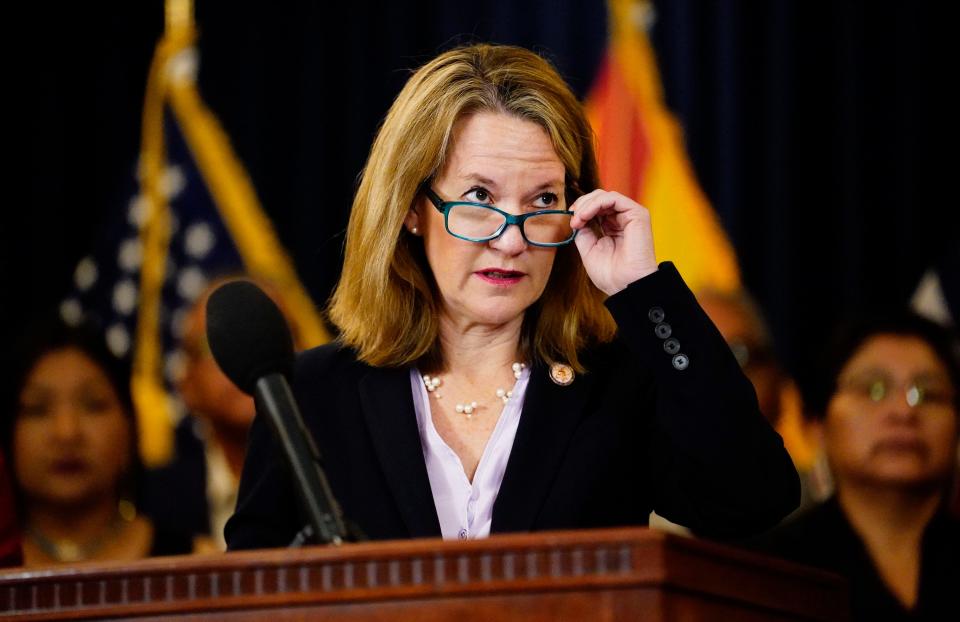English learners can't be blocked from dual language programs, Arizona attorney general rules
- Oops!Something went wrong.Please try again later.
- Oops!Something went wrong.Please try again later.
Arizona Schools Chief Tom Horne does not have the authority to withhold funding from schools that offer dual language programs, Attorney General Kris Mayes said in a legal opinion issued Monday, a blow to Horne's efforts to bar English learners from enrolling in the programs.
The Attorney general's opinion clears the way for Arizona schools to continue allowing English learners —students not yet proficient in English — to participate in dual language programs just days before the new school year begins in many districts.
Horne, a Republican, blasted the opinion by Mayes, a Democrat, as a partisan decision that overrules the will of Arizona voters who passed Proposition 203, a ballot initiative that requires English learners be taught only in English unless they obtain waivers.
"A dual language program without waivers is an obvious violation" of the law "to anybody who can read English," Horne said in a written statement.
Horne also suggested he will counter with legal action and raised the specter that parents may file lawsuits to stop schools from allowing English learners to participate in dual language programs without waivers.
Supporters of dual language programs, meanwhile, praised Mayes' opinion.
"This was an important win for us," said Daniel Hernandez Jr., government affairs director for Stand for Children Arizona, an advocacy group that on July 13 presented Horne and the State Board of Education with a petition including nearly 3,000 signatures demanding that English learners be allowed to participate in dual language programs.
The group is working to inform school districts and families heading back to school Wednesday that English learners can still participate in dual language programs, Hernandez said. But "we continue to be vigilant and keep watching Tom Horne as he has shown that he is not above doing things that I believe are illegal or completely outside of his scope and authority as the state superintendent," he said.
What are dual language programs?
Dual language programs have gained popularity in recent years as a way for English learners and fluent English speakers to become bilingual and biliterate. Under the programs, English learners learn side-by-side with fluent English speakers while receiving academic instruction in English for half of the day and the other half in another language, typically Spanish.
English learners are typically the children of immigrants or refugees who primarily speak another language at home. Native American students who primarily speak an Indigenous may also be classified as English learners.
Petition: Arizona dual language education supporters demand Tom Horne allow all students to participate
Horne, a staunch opponent of bilingual education, contends the best way for English learners to acquire English and become successful is through English-only immersion.
Horne has argued that English learners are barred from participating in dual language programs under Proposition 203. The ballot measure — passed by voters in 2000 during a period when the state's Spanish-speaking immigrant population was growing rapidly — requires English learners to be taught only in English. Critics say English-only immersion is ineffective and outdated.

In a letter sent to schools in June, Horne's office threatened to withhold education funding from schools that allow English learners to enroll in dual language programs unless they had been granted a waiver. The letter cited a memo from the Arizona Legislative Council, the legal arm of the state Legislature, that stated the dual language model "likely violates" Proposition 203.
Horne's letter prompted several Democratic lawmakers to request a formal legal opinion from Mayes, a Democrat, which Horne, a Republican, had not sought. The lawmakers, Rep. Nancy Gutierrez, D-Tucson, Rep. Jennifer Pawlik, D-Chandler, Rep. Judy Schwiebert, D-Phoenix, and Rep. Laura Terech, D-Phoenix, are all current or former educators.
"This is a big win for students and parents who choose to enroll their children in dual language programs," the lawmakers said in a joint statement Monday.
State Board of Education will rely on Mayes' opinion

Mayes declined in her opinion to say whether the 50-50 dual language immersion model complies with Arizona law, but the opinion noted that the model was approved by the State Board of Education under bipartisan legislation passed unanimously by the Legislature in 2019. That legislation aimed to give schools more flexibility to provide English language acquisition instruction to the state's 93,000 English learners, who make up about 8.5% of all Arizona students.
Mayes concluded that Horne, as superintendent of public instruction, does not have the authority to "impose any consequences on, or withhold any monies" from schools that use models approved by the State Board of Education.
Tom Horne to schools: Stop teaching English learners in Spanish or lose funding
Only the board "has the statutory authority to exclude" the dual language model from the list of approved models for teaching English to English learners and "to declare a school noncompliant and ineligible" for English learner funds, Mayes said in her opinion.
The opinion also states that no waivers are required for English learners to enroll in dual language programs because the board had approved the model for English learners.
In his statement, Horne accused Mayes of dodging the core legal issue and siding with Democratic lawmakers who support dual language programs for ideological reasons.
"So she refused to comment on whether a dual language program without waivers violates the voter protected initiative. She simply said that the state board has the power to adapt models under legislation. Neither the legislature nor the state board has the power to overrule a voter approved initiative," Horne said.
Horne said the issue "will obviously be resolved in the courts," and suggested parents may try to use an enforcement provision in Proposition 203 to stop schools from letting English learners participate in dual language programs without first receiving a waiver.
"Any parent can sue a school or district that adopts dual language without waivers, and if the parent is successful, the school board, and the superintendent, and maybe the principal must leave office and cannot apply for their offices for five years. That will be a considerable incentive for school districts not to adopt dual language without waivers," the statement said.
In her opinion, Mayes rebuked Horne for sending the letter to schools in June that said they could no longer use dual language programs to instruct English learners.
Contrary to Horne's letter, the opinion states, the State Board of Education has not modified or "otherwise deleted" the dual language model from the approved list of models for teaching English to English learners. As a result, the dual language model "remains an approved" model for schools to use and only the board "has the authority to determine whether school districts and charter schools are in compliance" with the English language learner statutes.
Horne's letter had generated confusion among schools over whether dual language programs remained in effect in Arizona for English learners. Dual language programs have gained popularity in Arizona schools since they were approved by the State Board of Education in 2020 as one of four models for providing English language acquisition and academic instruction to English learners. The other three models approved by the board are based on English-only instruction.
About 940 English learners participated in dual language programs in the 2021-2022 school year, up from about 745 the year before. Data for the 2022-2023 school year has not yet been released, but the number of English learners who participated in dual language programs likely increased since a growing number of schools in Arizona are now offering the programs.
Given the Attorney General's opinion, the State Board of Education will not alter any of the approved models for instructing English learners, including the dual language model, and the board will not take any action against schools that use the 50-50 dual language model to instruct English learners, the board said in a written statement issued Monday.
Daniel Gonzalez covers race, equity and opportunity. Reach the reporter at daniel.gonzalez@arizonarepublic.com or 602-444-8312. Follow him on Twitter @azdangonzalez.
This article originally appeared on Arizona Republic: Kris Mayes to Tom Horne: Dual language classes OK for English learners

